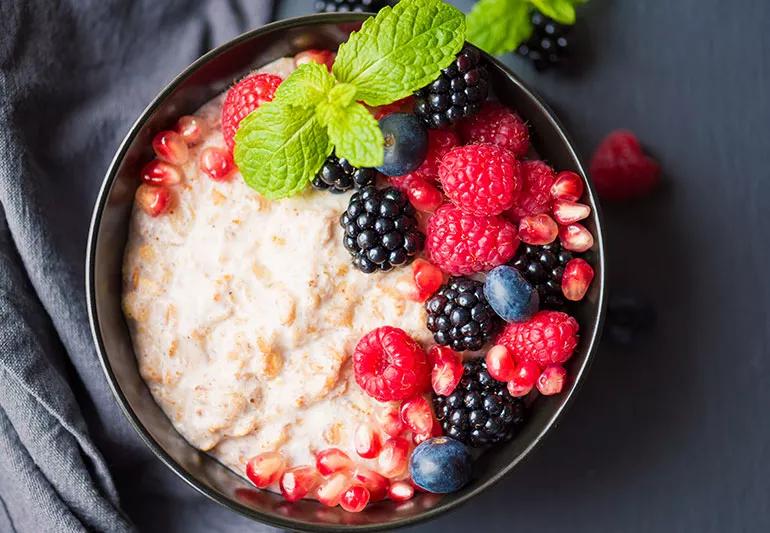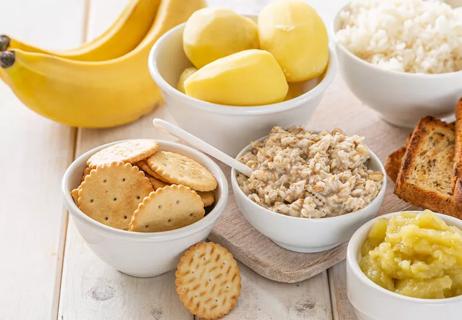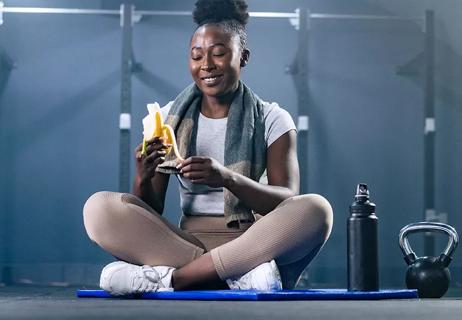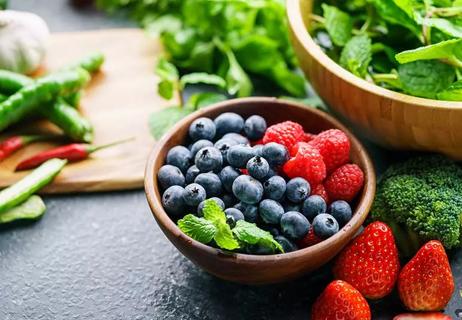The #1 tip is to eat foods that help you with a #2

Ugh. Your bloated belly feels like an overinflated balloon that’s ready to pop. Uncomfortable barely begins to describe your unfolding abdominal crisis. There has to be a way to find relief, right?
Advertisement
Cleveland Clinic is a non-profit academic medical center. Advertising on our site helps support our mission. We do not endorse non-Cleveland Clinic products or services. Policy
The answer is yes — and the solution might be sitting in your pantry or refrigerator. Certain foods can help reduce bloating by addressing digestive issues behind the unpleasant situation, says registered dietitian Beth Czerwony, RD.
So let’s head to the kitchen to see what’s available.
What’s fueling all of this bloating? Most likely, it’s linked to internal gas that’s building up in your innards due to constipation. “Everything is at a standstill,” says Czerwony. “Poop is just sitting there, fermenting, and making its presence known.”
Moving things along can be accomplished by adjusting what you eat and drink. The two big keys? Make sure your plate includes fiber-rich foods and that you’re consuming enough water.
Fiber helps food pass through your digestive tract at the proper pace. That’s critical. If the process is too slow, your poop hardens and you get constipated. If it’s too fast, the result is diarrhea.
Two types of fiber work to keep things on schedule:
Advertisement
Fluids work hand-in-hand with fiber to keep your digestive system running right. Keeping your body hydrated provides the water that softens stool. “If your poop is dry and hard, it’s a lot tougher to push out,” says Czerwony.
An abundance of foods can keep your gut healthy and digestion running efficiently. Each brings something different to the process, providing essential nutrients to maintain what can be a finicky system.
Here are a dozen items Czerwony suggests for your shopping list to keep bloating at bay.
When it comes to fiber content, few whole grains can match quinoa. The edible seed contains almost double the fiber of most other grains, making it a poop-moving powerhouse in the digestive game.
It’s also incredibly versatile in meals, as these four tasty recipes demonstrate.
This breakfast mainstay nearly matches quinoa when it comes to constipation-fighting fiber. Starting your morning with oatmeal may help you poop earlier in the day, too, flushing out waste hanging around from the previous day.
Aside from boosting hydration levels, green tea acts as a natural laxative to unclog your pipes. It offers a host of other health benefits, too, prompting Czerwony to call it the “Swiss Army knife of teas.”
There’s a natural enzyme in pineapple called bromelain that aids digestion. It does this by breaking down proteins in the food moving through your system, which basically improves your ability to process it.
Bromelain is so effective at softening up tough food, by the way, that it’s also used as a meat tenderizer.
Papaya offers similar anti-bloating benefits with another enzyme, papain.
Let’s start with a basic fact: Watermelon is more than 90% water, which means sucking down a slice can help keep you properly hydrated to beat the bloat. (Want to get creative with watermelon? Consider these three recipes.)
Think watermelon is loaded with H2O? Well, it’s nothing compared to celery. Those green stalks are about 95% water. Celery offers a healthy dose of fiber, too, making it a win-win, says Czerwony.
As an added bonus, celery also is loaded with a sugar alcohol known as mannitol that softens stool and provides a laxative effect. (Fast fact: Oral mannitol is often used to cleanse bowels before a colonoscopy.)
The real food heavyweight when it comes to water content? That would be cucumbers, which are a whopping 96% water. That’ll help wash away digestive issues created by dehydration.
There’s a reason why people have been reaching for ginger to resolve gastric distress for centuries: It works. The spice relaxes your intestines while also breaking down proteins with an enzyme called zingibain.
Advertisement
An apple a day can keep… well, constipation away. The fruit includes pectin, a gel-forming fiber that helps your digestive system maintain its groove.
Blueberries, blackberries, raspberries and strawberries all offer high levels of fiber. Each is relatively high in water content, too, which should help with hydration. (Pro tip: They also go well with the next item on the list.)
There is such a thing as “good” bacteria, and it can be found in your body… and in yogurt. Eating yogurt brings probiotics into your system to help digest food and maintain a healthy gut flora.
Interested in probiotics to help with bloating but not a fan of yogurt? No worries. There are other options, including fermented foods such as:
Eating the right food is important to prevent bloating, but it’s also important to eat S-L-O-W-L-Y, says Czerwony. Gobbling down your meals can send a lot of air into your stomach, which can lead to that balloon feeling.
Guzzling carbonated drinks can have the same effect as all of those bubbles hit your belly.
Video content: This video is available to watch online.
View video online (https://cdnapisec.kaltura.com/p/2207941/sp/220794100/playManifest/entryId/1_bfj9ofpg/flavorId/1_5f3sgelj/format/url/protocol/https/a.mp4)
In most cases, you can treat a bloated stomach at home. Here are some common remedies.
Easing or eliminating that bloated feeling often comes down to one thing — pooping regularly. “It’s no joke,” says Czerwony. “You always feel better after you poop.”
Advertisement
Learn more about our editorial process.
Advertisement

Peppermint oil, exercise and a belly massage can help, but for ongoing symptoms, you may need to talk to a healthcare provider

Opt for soft foods or liquids that are rich in protein, calories and vitamins

Delivered through an IV, options can include chemotherapy, immunotherapy or targeted therapy, or a combination

Irritable bowel syndrome has many signs, but lower abdominal pain, constipation and swelling may mean you should see a healthcare provider

Gallstones can block bile in your biliary system and lead to pain and discomfort

Help your aching belly by staying hydrated, eating bland foods and avoiding certain foods

Hunger is the obvious cause, but food quality, and lack of protein and water are also key

Different symptoms call for different menus

Wearing a scarf, adjusting your outdoor activities and following your asthma treatment plan can help limit breathing problems

Your diet in the weeks, days and hours ahead of your race can power you to the finish line

When someone guilt trips you, they’re using emotionally manipulative behavior to try to get you to act a certain way